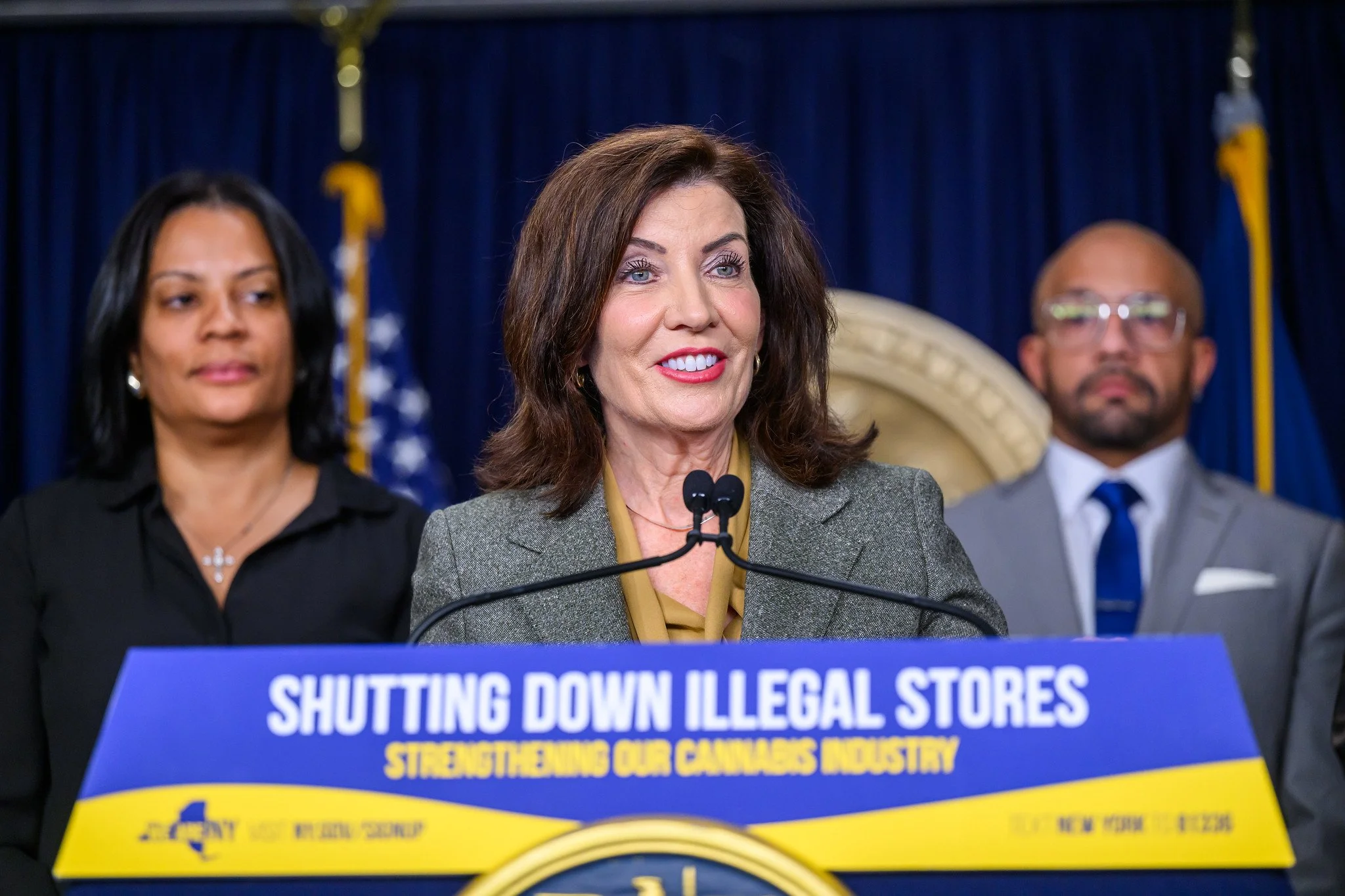Gov calls for broader enforcement against illegal pot shops
/Governor Kathy Hochul renewed her previous call to beef up the enforcement of illegal cannabis shops. Photo by Susan Watts/Office of Governor Kathy Hochul
By Ryan Schwach
Governor Kathy Hochul on Wednesday renewed her call for increased enforcement against illegal cannabis shops and announced steps to broaden the state’s enforcement through a proposal first introduced through her state budget plan last month.
The governor spoke alongside legal dispensary owners in Manhattan on Wednesday, saying that the illegal smoke shops opened across the state are hindering the legal market and creating a public safety issue.
“[Legal dispensaries’] very existence is under attack by illegal pot shops that seem to line every block, sometimes every other building in neighborhoods in this city and across the state of New York,” said Hochul. “These illicit vendors flagrantly violate our laws by selling to kids, evading our taxes, and engaging in fraudulent advertising about their products.”
The current pattern of enforcement isn't working, the governor said. Shops have continued to re-open time and time again after being temporarily shuttered by law enforcement.
“The illicit shops blatantly ignore the rules and undermine our efforts to support legitimate approved business owners,” she said.
Hochul spoke alongside owners of legal dispensaries, who say their illegal counterparts are hurting business.
“The economic impact of the illicit cannabis market extends far beyond our upstate farmers and legal dispensaries, affecting the quality of life for all our New York State residents,” said Alfredo Angueira, a co-owner of ConBud, a dispensary in Manhattan. “From lost tax revenues to diminished investment opportunities, the presence of illicit operators siphons away tax dollars dedicated to the communities the legal dispensaries are located in and taking valuable resources from our communities, stifling growth and prosperity. The fight against the illicit cannabis market is a fight for the future of our communities and our economy.”
Hochul wants to see the state and specific localities, like New York City, have more power in permanently closing shops pending the payment of fines and due process.
“Let's give the state and localities ways that they can padlock the doors number one, and shut down these flagrant violators,” said Hochul. “Let's start doing that, let's start having some teeth. They can appeal their fines, they can appeal their closure and everybody gets due process. But while that plays out in the courts, they will be shuttered and out of business.”
“The padlock stays on,” she added. “And they'll have to factor that in their business model on whether it makes sense for them to continue.”
As of now, according to the governor, only the state Office of Cannabis Management and the Department of Taxation and Finance have the ability to enforce the state’s cannabis laws. In New York City, those agencies are joined by other agencies like the Sheriff's Department and the Department of Consumer and Worker Protection.
But Hochul wants other agencies to have the same power.
“By enlisting our localities, places like the City of New York, we’ll have exponentially more people investigating and eventually helping shutter these illegal shops,” she said.
What exactly that enforcement looks like, and how it would be carried out by localities is currently unknown.
Hochul said that increased enforcement would not “re-criminalize” marijuana and would not bring back the racially biased enforcement that fueled the calls for legalization in the first place.
“I've heard some comments about how enforcing the law that was written to protect those who are doing it the right way…that somehow that’s going to return to the bad old days of mass incarceration of people of color,” said Hochul. “And yet over two-thirds of the legal dispensaries we have are minority and women owned businesses, and last year we doubled the number of legal Black owned dispensaries that exist.”
“New York has more legal dispensaries owned by people directly harmed by disproportionate enforcement of drug laws and communities of color than every other state combined,” she added. “So, those objectives are being met.”
Despite the governor’s statements, the Eagle has previously reported that the NYPD’s enforcement of cannabis-related offenses has continued to disproportionately affected Black and brown New Yorkers.
According to the NYPD’s own data, 449 cannabis offenses – made up of sale and possession charges – were made in 2023. Of those 449 offenders, 307 of them were identified as Black or Hispanic, constituting 68 percent of total offenses. Offenders who were identified as white accounted for just over 7 percent of offenses.
Hochul’s proposal, particularly when it relates to giving specific localities like New York City the power to enforce and close illegal shops, is similar to the SMOKEOUT Act, which has been proposed by Queens Assemblymember Jenifer Rajkumar.
Rajkumar promoted her bill alongside advocates at City Hall last week.
“[The bill] gives the sheriff the power, it'll give cities and municipalities all across the state the power to close down the shops, just like if there's a restaurant with health violations,” Rajkumar said last week.
The governor did not mention the SMOKEOUT Act during her remarks on Wednesday, however, Rajkumar applauded the governor’s statements.
“I applaud Governor Hochul for announcing today that she firmly backs shutting down the more than 36,000 illegal cannabis shops proliferating across our state,” Rajkumar said in a statement. “I am especially heartened that she is open to granting municipalities the power to shutter them without needing an order from the Office of Cannabis Management.”
“The only practical way to shut down the illegal stores is to expressly give localities the authority to do so on their own,” she added. “The budget language should make it unmistakably clear that the municipalities themselves have the authority to shut down the shops. Cities have the manpower to close down the shops and can get the job done.”




